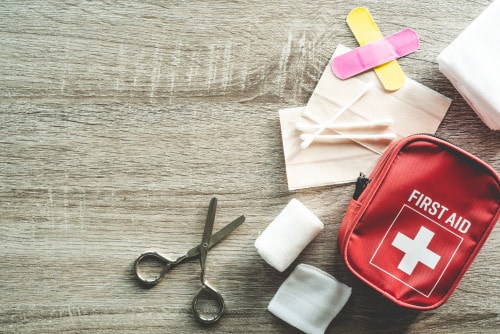5 basic medical skills you need to know to save yourself and others
To be prepared for any emergency, it is essential to expand your medical knowledge. However, there are some life-saving medical skills that are often overlooked, according to Natural News.
 |
| Photo: Shutterstock. |
It is important that you consider taking a basic first aid course or a refresher course to learn medical survival skills that can help you prepare for medical emergencies, according toNatural News.
1. Know how to open the airway and how to position the patient
A person who is unconscious, for whatever reason, is at risk of having their airway blocked - which can be fatal. You can open the airway by tilting the patient's head slightly and lifting their jaw forward. Then, lay them on their side, followingNatural News.
2. Apply pressure directly to the wound to stop bleeding.
There are many types of wounds that cause bleeding, the most dangerous of which is a severed artery. If you have a bleeding wound, the first thing to do is stop the bleeding.
If possible, try to wash your hands before stopping the bleeding to avoid infection. After washing your hands and wearing medical gloves or a clean, thin plastic bag, proceed:
Lay the victim down and raise the bleeding part up.
Clean any dirt or foreign objects from the wound. Never attempt to remove objects that are too large or too deeply embedded.
Use a clean cloth or bandage to press firmly on the wall of the injured blood vessel or wound for at least 20 minutes, without opening it to see if the bleeding has stopped.
Add more bandage if needed.
If the wound is in the arm, elevate the wound above the heart and compress it with a clean bandage until an ambulance or other medical help arrives, as directed.Natural News.
If bleeding does not stop, a tourniquet may be applied or hemostatic compounds may be used to stop the bleeding. Use a tourniquet to apply pressure to the artery at the following locations:
• Block the position above the elbow and under the armpit.
• Block the position behind the knee, near the groin.
Only when the bleeding has stopped, immobilize the injured body part and bandage the wound.
3. Prepare oral rehydration solution
People who are critically ill or injured often feel nauseous and have no desire to drink fluids. Because of serious illness or injury, their bowels are often slow to respond and do not function as well as they should. Oral rehydration solutions can improve their condition and even save their lives.
Oral rehydration solutions are a good way to replenish fluids and electrolytes in the body. This approach can help people who are moderately to severely dehydrated. Since sick and injured patients often do not want to drink anything, you will have to give them small amounts frequently. You can start by giving 5 ml every 2-3 minutes, then 150 ml every hour and 1.5 liters in 10 hours, according toNatural News.
4. Make sure to drink clean, hygienic water
No matter how thirsty you are, do not drink any water that comes your way. Make sure the water you drink is clean and safe. Drinking impure or unclean water can lead to serious gastrointestinal infections.
5. Wash your hands thoroughly
Washing your hands with soap and water is a simple practice that can save your life, yet it is almost forgotten or completely neglected.
Why is hand washing so important? Hands need to be rubbed with water to wash away germs. Doing this can significantly reduce the transmission of infectious diseases. Forgetting or neglecting to wash your hands can lead to bacteria being transferred from your hands to food, your mouth, or an open wound, causing life-threatening infections, according toNatural News.
Other important survival skills you need to know
To deal with emergency situations, it is also necessary to prepare and stock a first aid kit. Having a fully stocked first aid kit can save you time searching for the right tools to treat the wound.
Bandages and gauze are standard items that a first aid kit should have.
Add other supplies based on the specific needs of your family members. Have additional alternative medicines such as herbs and spices, as well as oils to treat mild to moderate injuries, as needed.Natural News.
Consider taking a coursebasic first aidor a refresher course to learn other medical survival skills that can help prepare you for medical emergencies.

